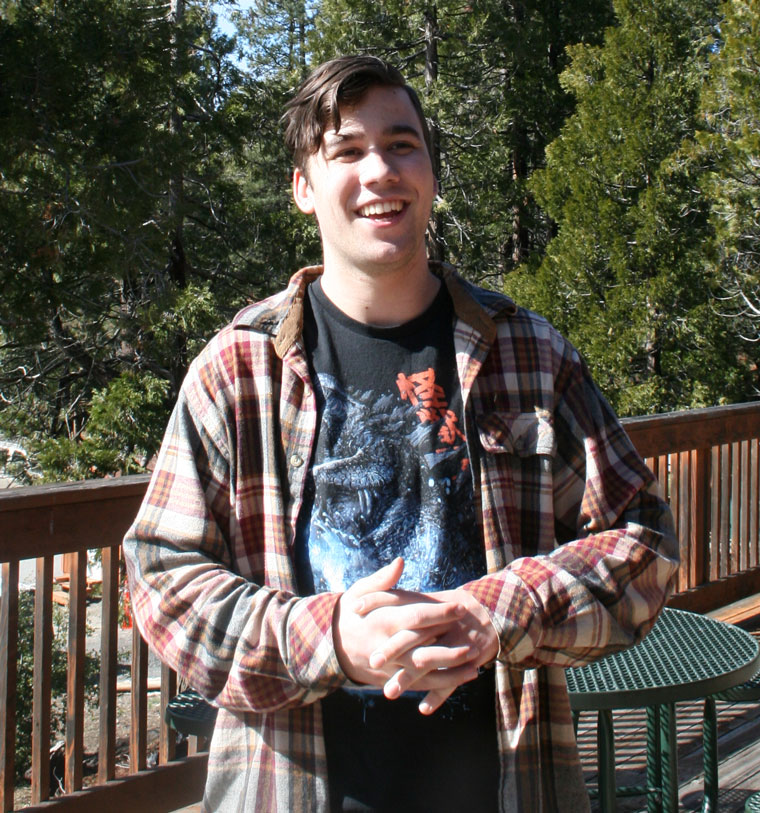
Photo by Marshall Smith
Six years with Marshall Hawkins
Hemet native Owen Zorn, Idyllwild Arts Academy jazz bassist, has already established a distinguished track record. At the recent Berklee High School Jazz Festival in Boston, Owen was part of an IAA jazz sextet that took first place in its category. Owen also received the highest individual recognition the festival awards — distinction for Superior Musicianship.
He has, in addition to his musical chops, solid academic ability. He plans to double major in economics and music at college, and has already been accepted at Cal State Northridge into their economics program.
But the greatest distinction, as Owen tells his story, is having been a student of IAA jazz legend Marshall Hawkins for six years. It began with one year of private study when he was 11, a year coming up to the academy to play in Hawkins’ ensembles when he was 12 and in eighth grade, and then four years as an academy student.
There is a certain Yoda-esque quality about the way Hawkins teaches, especially as Owen recalls. Hawkins’ approach was to train with questions rather than with rote musical exercises; to prod with philosophical hypotheses, rather than with repetition of riffs; and importantly, to get the student to trust his or her ability, to go deep within to find their own voice — the musical equivalent of the “Force” in “Star Wars.”
“I remember my first lesson with Marshall,” Owen recalled. “He came down to my house every Wednesday. I was 11. He told me things I did not then understand — philosophical things and questions that I did not fully understand until six years later. It was less about being a bass player and more about being a musician.
“One of his first questions was ‘What is the first sound you ever hear?’ The answer is your mother’s heartbeat. Another was ‘What does fire represent?’ The answer is energy.”
Owen recalled these foundational questions were really about the structure of music and how those fundamental elements are, like the “Force,” part of each person and a force into which jazz musicians can tap — to be in that place of playing freely with inspiration and improvisation.
One has to also develop technique, but as Owen remembers, Hawkins’ questions were his way of finding out who the student is as an individual so that the student would ultimately find their individual voice. “He first asked if I listened to jazz,” Owen remembered. “I hesitated and then said ‘no.’ Marshall said ‘good and don’t listen to jazz until I tell you.’ He wanted me to develop my own style and not just be imitating someone else.”
After one year of private study with Hawkins, Owen came up to the academy to play bass in Hawkins’ combos, since at that time there was not an academy student who played bass. “I remember the first time in combo,” Owen recalled. “Without any warning, he had me play a walking bass line and take a solo.” When asked how that turned out, Owen said, “Not very well.” But he remembered it was how Marshall taught — giving the students the opportunity and space to make mistakes and get better as a result. He entered the academy as a freshman and as a jazz major. He had been home-schooled by his mother from fourth through eighth grade.
Owen began playing violin when he was 2. “Until I started studying bass with Marshall, I had been doing my lessons for my teacher, but with Marshall I started to understand that I was really doing this for myself. He would give me something to learn and then it was me wanting to push myself to a higher level. I started to notice what I was doing right and then began to apply those things.
“Marshall did not repeat things at the beginning. But now he is repeating those first questions and bringing all those concepts back together. All those things he said at the beginning are the things I am learning now, and will be teaching me until I’m dead. It feels as if Marshall has prepared me to learn and to grow.”
Both Owen and his older brother Sam attended IAA as musicians. Sam is now studying engineering in college.










